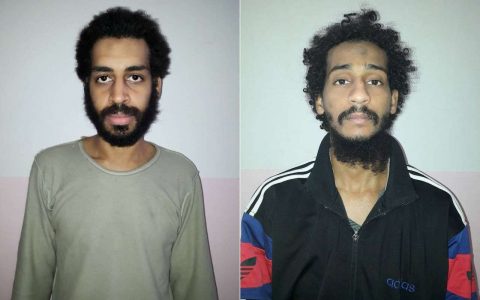
ISIS ‘Beatles’ challenge government over sharing evidence with US that could have led to death penalty
The mother of one of the Isil ‘Beatles’ is to challenge a government decision to share evidence with the United States without assurances that her son would not face the death penalty after extradition.
The Supreme Court will today hear her challenge of the Home Office’s decision to share 600 witness statements about two suspected Islamic State terrorists.
El Shafee Elsheikh and Alexanda Kotey are accused of belonging to a brutal four-man cell of IS executioners in Syria – nicknamed The Beatles because of their British accents – responsible for killing a number of high-profile Western captives.
The pair were captured in January last year, sparking a row over whether they should be returned to the UK for trial or face justice in another jurisdiction.
At a High Court hearing in October last year, Mr Elsheikh’s mother, Maha Elgizouli, challenged then home secretary Sajid Javid’s decision to share 600 witness statements gathered by the Metropolitan Police with US authorities.
The evidence was shared under a “mutual legal assistance” (MLA) agreement without the home secretary seeking assurances the men would not face execution if they were extradited and tried in the US.
Her case was rejected in January by two leading judges, who concluded that Mr Javid’s decision was not unlawful.
But Ms Elgizouli is now challenging that ruling at the Supreme Court, where a panel of seven justices will hear her case on Tuesday and Wednesday.
During the High Court hearing, Ms Elgizouli’s lawyers said Mr Javid’s decision, which was outlined in a letter to then US attorney general Jeff Sessions, was “unprecedented and unjustified” and put the suspects at risk of an “inhuman punishment”.
Edward Fitzgerald QC told the court the decision was taken “against advice from officials” that an assurance should be sought.
He said it was influenced by the “anticipated outrage” of members of the Trump administration if the UK asked for assurances that the pair would not face the death penalty.
However, rejecting the case, the Lord Chief Justice Lord Burnett, sitting with Mr Justice Garnham, said: “There is no general, common law duty on Her Majesty’s Government to take positive steps to protect an individual’s life from the actions of a third party and that includes requiring particular undertakings before complying with the MLA request.”
Mr Javid faced intense criticism after the letter he wrote to Mr Sessions was leaked, with MPs accusing him of breaching the UK’s long-standing opposition to the death penalty.
The Government’s former reviewer of anti-terror legislation, Lord Carlile, branded the move “extraordinary” and said it was a “dramatic change of policy”.
Then prime minister Theresa May supported Mr Javid’s original decision, which was also backed by Boris Johnson when he was foreign secretary.
But the MLA sparked widespread criticism in Westminster from across the political divide.
Kotey and Elsheikh, who were raised in the UK, were stripped of their British citizenship after being captured by Kurdish forces in Syria.
They are said to have been members of the cell which also included Mohammed Emwazi, known as Jihadi John, who was killed in a US air strike in 2015, and Aine Davis, who has been jailed in Turkey.
Emwazi appeared in a number of videos in which hostages, including British aid workers David Haines and Alan Henning and US journalists James Foley and Steven Sotloff, were killed.
The Crown Prosecution Service (CPS) previously decided there is “insufficient evidence” to prosecute them in the UK.
Kotey spoke of his time as a hostage keeper with IS during an interview with ITV News, which was broadcast in May.
A statement issued ahead of the hearing by Birnberg Peirce Solicitors, who are representing Ms Elgizouli, said: “The minister’s letter revealed a clear and dramatic departure from the UK’s longstanding international and domestic commitment to oppose the use of the death penalty in all circumstances.
“The UK has again and again in practice refused to contribute to the risk of the application of the death penalty in proceedings elsewhere in the world and our time-honoured and proud requirement of unbreakable assurances that the death penalty not be imposed has been hammed out in decisions taken by the UK Government.
“Ms Elgizouli’s appeal before the Supreme Court raises questions of enormous constitutional importance, including the ability of a minister – without reference to Parliament – to authorise a complete departure from the prohibition understood by all to have the status of constitutional certainty.
“This all happened without any public debate.”
Source: Telegraph





